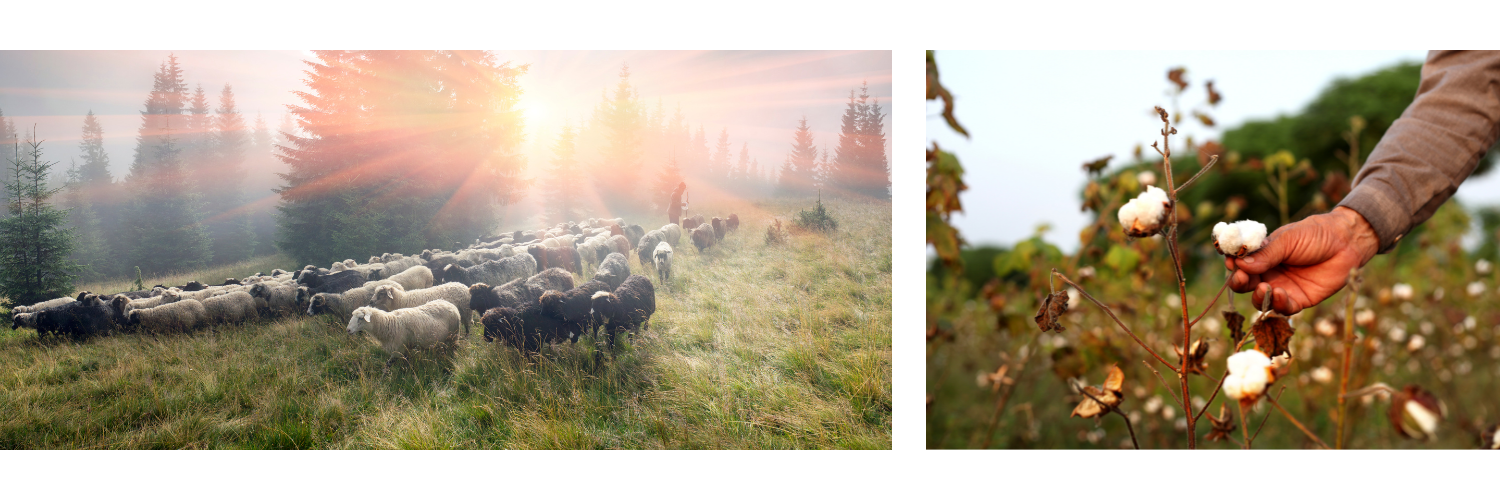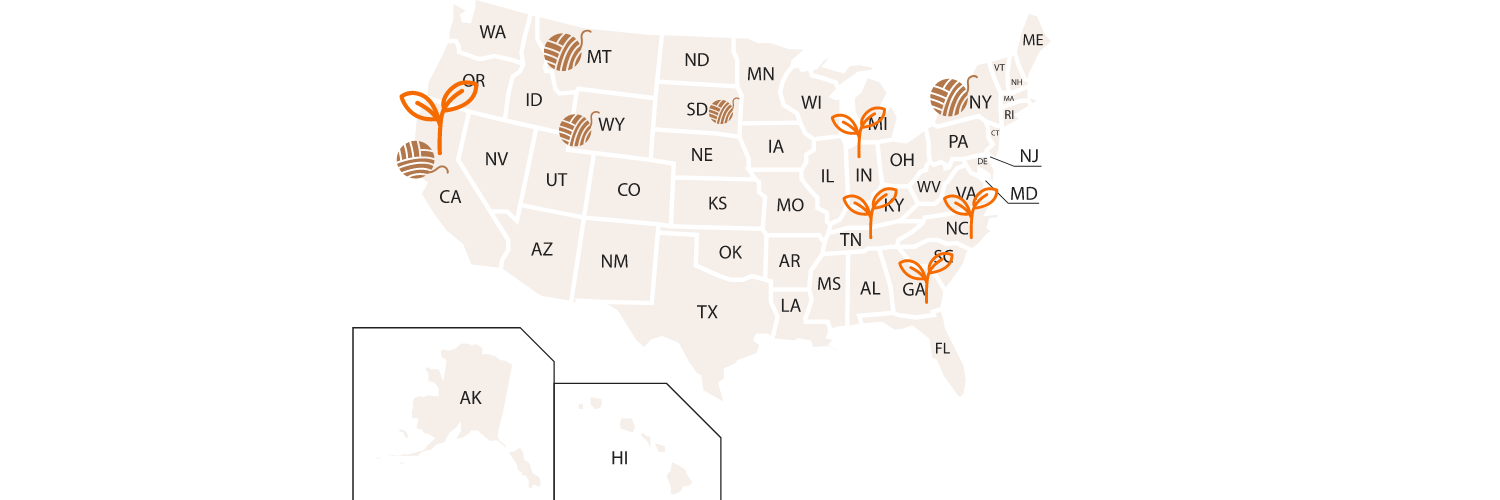About the Climate Beneficial Fiber Partnership
Six Partners Supporting Climate Beneficial Fiber
The National Center for Appropriate Technology (NCAT) and its five Climate Beneficial Fiber project partners—Carbon Cycle Institute, Colorado State University, Fibershed, New York Textile Lab, and Seed2Shirt are supporting the expansion of climate-smart wool and cotton production on at least 100 farms and ranches spread across 2 million acres in 9 states.
What We Are Investing
More than $18 million will be invested directly with wool producers in California, Montana, New York, South Dakota, and Wyoming and cotton producers in California, Georgia, Indiana, North Carolina, and Tennessee to adopt practices with quantifiable greenhouse gas benefits. (See map below.) The project aims to meet the equity goals of the Justice40 Initiative and will prioritize engagement with historically underserved producers.
Funding for this partnership comes from USDA’s Partnerships for Climate-Smart Commodities Program.
Why Fiber?
Growing concerns about textile-derived microplastics, land-use impacts, and human rights have prompted an industry-wide shift to seek natural fiber sources with verified benefits to land and climate. This program aims to promote healthy soils and benefit the climate while simultaneously driving greater market investment in wool and cotton products that are grown using sustainable agriculture practices.
How We Help Farmers and Ranchers
Through a process known as Carbon Farm Planning, participating farms and ranches will work with Planners in the field to create a tailored conservation plan that identifies opportunities to achieve farm and ranch goals while simultaneously boosting the carbon cycle as the principal energy pathway driving agricultural productivity. Participants will then receive technical assistance and fixed cost-share incentive payments to support adoption of select conservation practices in their Plan. The Climate Beneficial Fiber Partnership will make payments generally following the standard EQIP 75% cost share state rate and the enhanced 90% cost share state rate for eligible producers/practices.

This project is not affiliated with any carbon market and does not issue or verify carbon credits. For further questions, please reach out to fiberpartnership@ncat.org
Climate and Agroecosystem Impacts
The 20-year greenhouse gas impact of practices implemented on enrolled lands during the 5-year grant period is projected to be 3 million metric tons of carbon dioxide equivalent (CO2e). Other benefits will include reduction in synthetic fertilizers, improved soil health and increased soil organic matter, and enhanced resilience to changing climate conditions. Farms and ranches that focus on increasing soil carbon see a variety of benefits, such as:
- Resilience to climate stressors such as drought, flooding, and extreme heat
- Increase soil microbial activity, which improves nutrient cycling
- Reduced need for synthetic fertilizer
- Better water availability and water quality
- Increased pollinator and wildlife habitat
Climate Beneficial™ Verification
Climate Beneficial™ Verification is a verification program and product label created to support farmers and ranchers in landscape stewardship that builds healthy soil and resilient farming and ranching businesses. Our goal is to develop markets for materials that come from working landscapes where the drawdown of atmospheric carbon is being enhanced through verified management practices that increase soil organic matter, forage quality, biodiversity, and more.
Climate Beneficial™ Verification enables producers who are currently practicing or transitioning to carbon farming to plan, monitor, report, and verify their practices and outcomes in order to receive premiums and/or payments for their environmental stewardship. Impact data is made available to buyers through verification and can be used for sustainability reporting and marketing. CBV also ensures fibers are fully traceable back to the farm.
Climate Beneficial Verification was developed by Fibershed in 2015 in collaboration with The Carbon Cycle Institute, scientists, and technical service providers.
Growers who enroll in the Climate Beneficial Fiber Partnership (CBFP) USDA grant can choose to solely engage in the grant and cost-share program. After joining the CBFP, growers then have the option to apply to participate in the Climate Beneficial™ Verification program. The Climate Beneficial Verification requires additional practice agreements, outcome metrics, and practice verification processes beyond what CBFP requires.
To learn more, please visit the Climate Beneficial™ Verified Fiber website.
Market Development for Climate Beneficial™ Verified Fibers
The Partnership’s regional teams, including Fibershed, Seed2Shirt, and New York Textile Lab, and NCAT work to build markets for Climate Beneficial Verified Fibers by developing market connections, supply system partnerships, and long-term purchasing relationships between growers and buyers that enable growers to receive a premium price for verified fibers.
CBFP is working to build markets for CBV fibers in the following ways:
- Increase the market recognition and demand for Climate Beneficial Verified products through education and marketing
- Market verified fibers to buyers.
- Build sourcing relationships between producers and buyers. Fibershed does not directly buy and sell fibers.
- Develop buyer agreements that fairly compensate growers for their work and pay premium prices for fibers.
- Develop programs with textile manufacturers that enable brands to source Climate Beneficial™ fibers.
- Promote the verification and products in textile markets through online marketing and attending industry events.
- Educate brands on the benefits to their company for investing in Climate Beneficial™ Verification products and the on-farm realities of transitioning to climate beneficial practices.
- Helps brands develop storytelling and marketing resources for Climate Beneficial™ Verification.
- Please note the partnership cannot guarantee a market for verified fibers or a specific price premium. Our aim is to build markets and buyer partnerships that enable growers to sell their fibers at a premium price.
To learn more about Climate Beneficial Verification contact Climatebeneficial@fibershed.org


